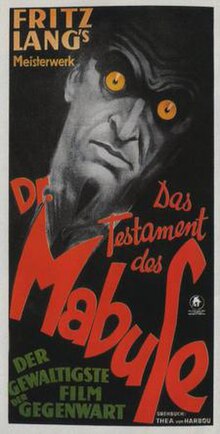The Testament of Dr. Mabuse
1933 film by Fritz Lang / From Wikipedia, the free encyclopedia
Dear Wikiwand AI, let's keep it short by simply answering these key questions:
Can you list the top facts and stats about The Testament of Dr. Mabuse?
Summarize this article for a 10 year old
The Testament of Dr. Mabuse (German: Das Testament des Dr. Mabuse), also called The Last Will of Dr. Mabuse,[2] is a 1933 German crime-thriller film directed by Fritz Lang. The movie is a sequel to Lang's silent film Dr. Mabuse the Gambler (1922) and features many cast and crew members from Lang's previous films. Dr. Mabuse (Rudolf Klein-Rogge) is in an insane asylum where he is found frantically writing his crime plans. When Mabuse's criminal plans begin to be implemented, Inspector Lohmann (Otto Wernicke) tries to find the solution with clues from gangster Thomas Kent (Gustav Diessl), the institutionalized Hofmeister (Karl Meixner) and Professor Baum (Oscar Beregi Sr.) who becomes obsessed with Dr. Mabuse.
| The Testament of Dr. Mabuse | |
|---|---|
 Austrian film poster[1] | |
| Directed by | Fritz Lang |
| Written by | Thea von Harbou Fritz Lang |
| Produced by | Seymour Nebenzal |
| Starring | Rudolf Klein-Rogge Otto Wernicke Oscar Beregi Sr. Gustav Diessl |
| Cinematography | Karl Vash Fritz Arno Wagner |
| Edited by | Conrad von Molo[lower-greek 1] Lothar Wolff[lower-greek 2] |
| Music by | Hans Erdmann |
| Distributed by | Nero-Film |
Release date |
|
Running time | 124 minutes[lower-greek 1] |
| Country | Germany |
| Language | German[lower-greek 1] |
The Testament of Dr. Mabuse was based on elements of author Norbert Jacques' unfinished novel Mabuse's Colony. It was Lang's second sound film for Nero-Film and was his final collaboration with screenwriter Thea von Harbou, then his wife. To promote the film to a foreign market, a French-language version of the film was made by Lang with the same sets but different actors with the title Le Testament du Dr. Mabuse.
According to Siegfried Kracauer, Lang intended the film to suggest the Mabuse-like qualities of Adolf Hitler,[2] who was on his rise to become Chancellor of Germany while the film was being written. When Hitler came to power, Joseph Goebbels became Minister of Propaganda and banned the film in Germany, suggesting that the film would undermine the audience's confidence in its statesmen. The French-language and German-language versions of the film were released in Europe while several versions of the film were released in the United States to mixed reception with each re-release. The sequel The Thousand Eyes of Dr. Mabuse (1960) was also directed by Lang. Critics have received the film favorably, and it has influenced filmmakers Claude Chabrol and Artur Brauner.
Oops something went wrong: